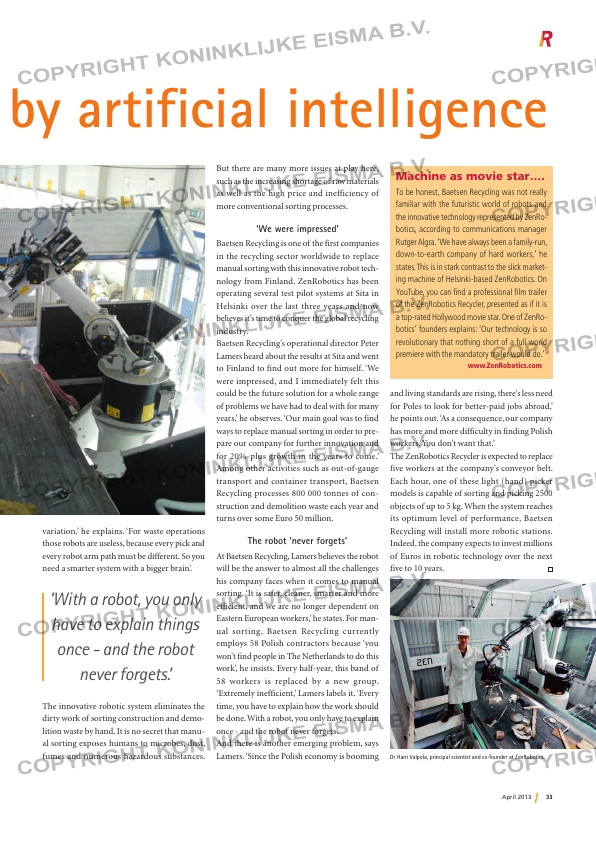Page 33 from: April 2013

33April 2013
variation,’ he explains. ‘For waste operations
those robots are useless, because every pick and
every robot arm path must be different. So you
need a smarter system with a bigger brain’.
The innovative robotic system eliminates the
dirty work of sorting construction and demo-
lition waste by hand. It is no secret that manu-
al sorting exposes humans to microbes, dust,
fumes and numerous hazardous substances.
But there are many more issues at play here,
such as the increasing shortage of raw materials
as well as the high price and inefficiency of
more conventional sorting processes.
‘We were impressed’
Baetsen Recycling is one of the first companies
in the recycling sector worldwide to replace
manual sorting with this innovative robot tech-
nology from Finland. ZenRobotics has been
operating several test pilot systems at Sita in
Helsinki over the last three years and now
believes it’s time to conquer the global recycling
industry.
Baetsen Recycling’s operational director Peter
Lamers heard about the results at Sita and went
to Finland to find out more for himself. ‘We
were impressed, and I immediately felt this
could be the future solution for a whole range
of problems we have had to deal with for many
years,’ he observes. ‘Our main goal was to find
ways to replace manual sorting in order to pre-
pare our company for further innovation and
for 20%-plus growth in the years to come.’
Among other activities such as out-of-gauge
transport and container transport, Baetsen
Recycling processes 800 000 tonnes of con-
struction and demolition waste each year and
turns over some Euro 50 million.
The robot ‘never forgets’
At Baetsen Recycling, Lamers believes the robot
will be the answer to almost all the challenges
his company faces when it comes to manual
sorting. ‘It is safer, cleaner, smarter and more
efficient, and we are no longer dependent on
Eastern European workers,’ he states. For man-
ual sorting, Baetsen Recycling currently
employs 58 Polish contractors because ‘you
won’t find people in The Netherlands to do this
work’, he insists. Every half-year, this band of
58 workers is replaced by a new group.
‘Extremely inefficient,’ Lamers labels it. ‘Every
time, you have to explain how the work should
be done. With a robot, you only have to explain
once – and the robot never forgets’.
And there is another emerging problem, says
Lamers. ‘Since the Polish economy is booming
and living standards are rising, there’s less need
for Poles to look for better-paid jobs abroad,’
he points out. ‘As a consequence, our company
has more and more difficulty in finding Polish
workers. You don’t want that.’
The ZenRobotics Recycler is expected to replace
five workers at the company’s conveyor belt.
Each hour, one of these light (hand) picker
models is capable of sorting and picking 2500
objects of up to 5 kg. When the system reaches
its optimum level of performance, Baetsen
Recycling will install more robotic stations.
Indeed, the company expects to invest millions
of Euros in robotic technology over the next
five to 10 years.
’With a robot, you only
have to explain things
once – and the robot
never forgets.’
sorted by artificial intelligence
Machine as movie star….
To be honest, Baetsen Recycling was not really
familiar with the futuristic world of robots and
the innovative technology represented by ZenRo-
botics, according to communications manager
Rutger Algra. ‘We have always been a family-run,
down-to-earth company of hard workers,’ he
states. This is in stark contrast to the slick market-
ing machine of Helsinki-based ZenRobotics. On
YouTube, you can find a professional film trailer
of the ZenRobotics Recycler, presented as if it is
a top-rated Hollywood movie star. One of ZenRo-
botics’ founders explains: ‘Our technology is so
revolutionary that nothing short of a full world
premiere with the mandatory trailer would do.’
www.ZenRobotics.com
Dr Harri Valpola, principal scientist and co-founder at ZenRobotics.
RI-3_ZenRobotics Baetsen.indd 33 08-04-13 09:16



